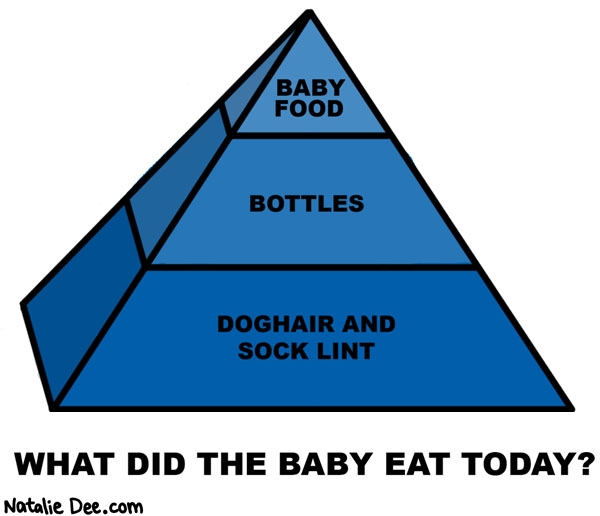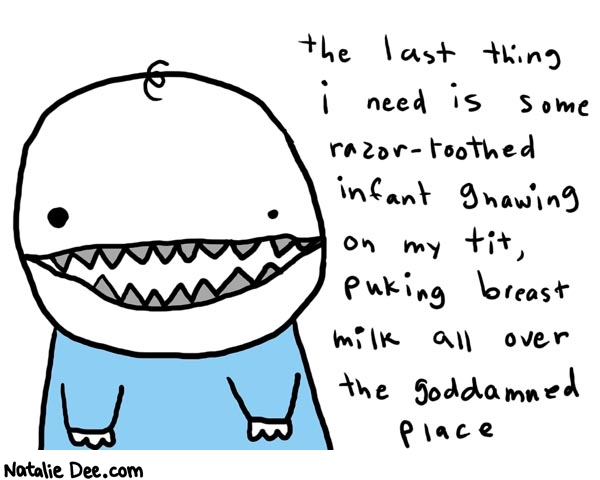Sorry guys, no pictures of boobs :( Although I am no where near being pregnant or thinking about having to breastfeed, I came across a section in the book The Whole Soy Story by Kaayla T. Danie, PhD, CCN that was related to soy in infant formulas as well as using soymilk instead of formulas. So I thought I would elaborate in case some of you out there are pregnant or have a newborn. All of the information in this post comes from the book mentioned above and The Womanly Art of Breast Feeding by the La Leche League International (plus my own humble thoughts).
First I will start with the benefits of breastfeeding your baby:
- There is no formula that comes close to the milk your body creates. Your milk has every vitamin, mineral, and other nutritional element that your baby's body needs (including many that have not even been discovered or named yet.
- Your breast milk changes throughout the meal, day, and year to match the subtle changes in your babies requirements.
- Living cells that are unique to your milk inhibit the growth of harmful bacteria and viruses in his or her still maturing system.
- Colostrum, the milk you produce in small amounts in the first couple of days after your baby is born (and which you start producing while you are pregnant) has concentrated immunological properties that are your baby's first protection against all the germs he or she is suddenly exposed to. This "first milk" contains an anti-infective agent that coats his or her intestines to protect against the passage of germs and foreign proteins that could create allergic sensitivities.
- Breastfeeding deepens your attachment to each other
- Without it's mother's breast milk, the baby is at a higher risk of:
- ear infections
- intestinal upsets
- respiratory problems
- allergies
- dental problems
- Without it's mother's breast milk, the baby's vision, nerves, and intestines don't develop fully. His or her kidneys and liver work harder to process the waste products from the formula. He or she will need more of any medication to get the same effect, his or her immune system's response to vaccinations is less effective, and the risk of SIDS (Sudden Infant Death Syndrome) are higher. (Source: The Womanly Art of Breastfeeding by the La Leche League International)
Now on to what I read about soy milk and infant formulas...
News headlines about babies being severely damaged by soy milk used as a substitute for infant formula sent ripples through the health food industry in 1990. The first story came from Arkansas where a severely malnourished 5 month old baby was admitted to a hospital for heart failure, rickets, vasculitis and neurological damage. This baby had been fed nothing but SoyMoo since she was 3 days old. An analysis of the soy milk revealed deficiencies in calcium, niacin, and vitamins D, E and C. On June 3rd, 1990, after several other cases had been publicized, the FDA issued a warning about using soy milk instead of infant formula saying they were "grossly lacing in the nutrients needed for infants" and asked all manufacturers, importers and private label distributors to put warning labels on soy milks so they would not be used as formula substitutes.
Soy infant formula was never used traditionally in Asia. Babies who could not be breastfed by their birth mothers received homemade dairy formulas made with mare, water buffalo, cow, or goat's milk, were breastfed by a wet nurse...or died. Inventors of the first soy formulas were westerners with very good intentions- to save babies that would not otherwise have survived. (Did I ever tell you the saying "the road to Hell is paved with good intentions"? NO? Well it's true. Good intentions do not promise good outcomes.)
Here were some of the problems with the original soy formulas from the 1940's-1960's:
- vitamin A deficiencies
- vitamin K deficiencies
- vitamin B12 deficiencies
- calcium deficiencies
- zinc deficiencies
- iron deficiencies
- gastrointestinal side effects
- thyroid damage
- too much manganese associated with brain damage, learning disabilities, ADD, violence- AWESOME!
Soy infant formula manufacturers have also failed to match the fatty acid profile of breast milk. Soy formulas also lack cholesterol, a vital substance needed by the growing babies brain and nervous system. Human breast milk is something like 50% cholesterol (I read that somewhere recently- not from this book), AND breast milk contains a special enzyme to ensure that the baby absorbs all the cholesterol available.
Soy formulas also adversely effect the immune system leading to more infections than breast or cow's milk formulas.
And the best part about all of this is! Soy formulas are made with soy protein isolate (SPI) which is the product of a high-tech industrial processing involving high temperatures, high pressures, solvent extraction and alkaline baths. These processes compromise protein, vitamin and mineral quality and create toxins. Soy formulas also contain levels of aluminum 10 times greater than milk-based formula and 100 times greater than breast milk- which can negatively affect bone and nervous system development.
The ingredient lists of most brands of soy formula reveal many additives of questionable safety such as carrageenan, guar gum, sodium hydroxide (caustic soda), potassium citrate monohydrate (must be so healthy!), tricalcium phosphate, dibasic magnesium, phosphate trihydrate, BHA, and BHT. Wow, I don't know about you but I don't know what any of that S-H-I-T is?!?
WHAT THE F- ARE YOU ABOUT TO FEED YOUR PERFECT NEWBORN BABY??????
AFTER EVERYTHING I HAVE BEEN WRITING ABOUT NOT FEEDING YOURSELF CHEMICALS...PLEASE, PLEASE, PLEASE DO MORE RESEARCH IF YOU STILL NEED TO BE CONVINCED OF NOT FEEDING YOUR PERFECT BABY THIS GARBAGE!
"Some mothers say they don't want to breastfeed because they don't want to be tied down, but most breastfeeding mothers will tell you that breastfeeding actually frees them up! No measuring, spilling, or heating. No planning, leftovers, or spoilage. Most likely a lot fewer trips to the doctor. Your milk is always available, always the right temperature, and never spoiled, no matter how hot or cold it is outside. The money that you don't spend on formula in a year could pay for a high-end appliance. And- this is a big one- in an emergency of any kind, from a minor problem to a natural disaster that means shortages of formula and clean water to prepare it, breastfeeding your baby is one way to ensure you'll always have a way to feed him or her," writes the La Leche League in their book The Womanly Art of Breastfeeding.
Here are some other links to more information:
http://www.breastfeeding.com/
http://www.llli.org/nb.html
http://en.wikipedia.org/wiki/Breastfeeding
http://www.kellymom.com/bf/



No comments:
Post a Comment